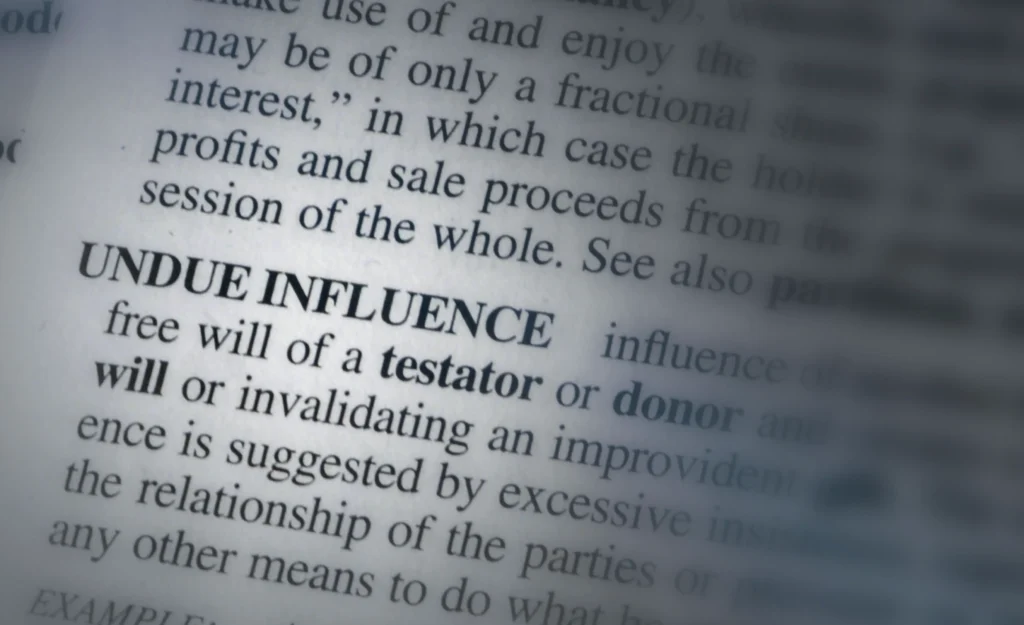Home | Practice Areas | Trust Litigation | Undue Influence Claims
Concerns around undue influence in trust creation and administration can threaten the validity of a trust and prevent the fulfillment of the interests of the trust. Our team of California and Texas undue influence attorneys may be able to help preserve the creator’s intentions and safeguard your interests.
Undue influence is considered excessive persuasion, in which the intent of the victim is replaced with the intent of the wrongdoer.
Undue influence typically occurs when a trustor or trustee is encouraged to act in a manner unaligned with their own free will—this often occurs when an individual takes advantage of a trustor or trustee’s mental incapacity. This influence is typically for the sake of a bad actor’s own personal gain and at the expense of the interests of the trust.
Undue influence can invalidate a trust and require the experience of a skilled attorney to ensure a trust creator’s wishes are preserved. A trust undue influence attorney from RMO Lawyers can provide support in these cases in California or Texas to ensure that the interests of the trust are fulfilled and parties are protected against harmful influence.
Trust capacity and undue influence claims require certain legal proceedings to bring about a case. Our attorneys at RMO will help gather evidence of incapacity and understand the interests of the trust creator to bring about an appropriate resolution.
Proving incapacity is an essential first step in a claim. A trust document may outline the criteria for incapacity, or it may be necessary to review medical records or conduct a more thorough assessment. RMO lawyers can assist in assessing incapacity through appropriate procedures while maintaining sensitivity throughout the process.
Undue influence occurs when another party influences a trustor to make a decision surrounding a trust for their own personal gain. Our lawyers can help prove undue influence using Probate Code Section 86 as a standard for measuring the influencer’s actions and then take steps to seek appropriate restitution.
The legal process for resolving trust disputes requires specific steps to prove incapacity and preserve the decedent’s wishes. This process may include mediation, litigation, and alternative dispute resolution methods. RMO’s trust attorneys provide guidance for our attorneys in navigating this process to safeguard the interests of the trustor.
Undue influence claims pose a threat to the true interests and intentions of a trustor and its creator. Our team at RMO Lawyers works to protect the rights and interests of our clients by taking steps to understand the trustor’s wishes and ensure the trust upholds these desires.
Our probate attorneys focus on all types of undue influence claims. Whether you’re a trustee, executor, heir, or beneficiary we can help you resolve your probate dispute.
Cases of trust incapacity and undue influence often result in specific circumstances. Concerns around trust capacity and undue influence most commonly arise in cases of dementia or other age-degenerative conditions that lead to mental incapacity.
If interested parties determine that a trust was impacted by undue influence or a lack of capacity, legal action is often necessary to modify or revoke the trust so that it aligns with an individual’s true interests. At RMO, we can help you determine whether a trust is revocable or irrevocable and how to approach the process.
In cases where undue influence has been imposed upon a trustee or trustor, interested parties may raise a trust contest to question the integrity of the estate documents. Our lawyers at RMO will assist in assessing capacity, securing necessary documentation, and gathering evidence to contest a trust and protect the decedent’s interests.
In cases of mental incapacity, an individual may be vulnerable to financial exploitation from other parties through scams or malevolent influence. RMO Lawyers will work to identify potential risks, establish protections around their assets, and prevent cases of undue influence in California and Texas.
If there are concerns surrounding the capacity of a trustor or trustee during the creation of the trust, legal intervention may be necessary to address conflicting opinions and ensure the trust’s validity. Our lawyers can help to assess capacity and resolve these disputes through litigation or mediation.
A case of lack of capacity or undue influence does not have to lead to litigation in order to find a resolution that safeguards the interests of the grantor. Our team at RMO can represent clients in California or Texas in mediation to prevent lengthy legal battles and preserve familial relationships.
You should consider contacting an attorney for trust undue influence claims as soon as you suspect that undue influence may have played a role or is currently playing a role in the creation or modification of a trust. Early involvement of an attorney can help protect your legal rights and provide guidance on how to proceed.
Undue influence claims in California and Texas are complex and require a skilled and experienced attorney. If you’re unsure whether you may benefit from the support of an attorney in your case or have any questions surrounding the case, schedule a free consultation with our team at RMO Lawyers.
Undue influence can affect several interested parties involved in a trust. RMO trust litigation attorneys can support all the following clients in California or Texas in an undue influence case.
Beneficiaries and/or Heirs are directly impacted by undue influence, as the claim threatens their rightful inheritance. Our attorneys advocate for beneficiaries in these cases to ensure they receive their rightful inheritance as initially outlined by the trust.
In certain situations, trustees may have to defend themselves against claims of undue influence or navigate concerns surrounding trust management. Depending on the circumstances, our attorneys can help trustees navigate the situation to ensure they uphold their fiduciary duty and achieve the best possible outcome.
Successor trustees may find evidence in their position that the original trustee was unduly influenced when administering the trust. In these cases, our team of trust litigation attorneys can investigate the matter and pursue legal action if necessary.
A trustor or settlor with concerns about someone’s influence can seek out an attorney to help take measures to safeguard their interests, like establishing a conservatorship or guardianship, transferring power of attorney, or replacing a trustee. Our attorneys at RMO can support trustors and settlors in taking the best possible path.
Creditors have an interest in recovering any potential debts from the decedent as part of the assets of a trust. A case of undue influence on a trustor can result in creditors losing their rightful distribution from a trust. RMO Lawyers represent creditors to support them in recovering their debts.
A trust impacted by undue influence can affect several different parties, and a lawyer can support anyone who believes it could threaten the validity of the trust and its interests. At RMO, we support parties like surviving children, close relatives, conservators or guardians, and more.
Answers to common questions about trustee removal, suspension, and resignation, helping you better understand your rights and the legal processes involved in protecting your interests.
Signs of undue influence can manifest in various ways, such as sudden and significant changes in the victim’s financial arrangements or estate plans, particularly if they disproportionately benefit the influencer. The victim may also become isolated from friends and family, making them more vulnerable to manipulation. Coercive tactics, including threats or emotional manipulation, may be employed to pressure the victim into complying with the influencer’s wishes. After the victim’s death, family members may notice discrepancies in the estate plan or financial transactions that raise suspicions of undue influence. If you observe any of these signs, it’s essential to seek advice from an RMO attorney to assess your claims.
The most common scenario we see is the abuser is often a caregiver- whether they are a child, spouse, or even hired in-home care nurse. The caregiver may psychologically manipulate or threaten an elderly individual to be given money or be left a specific property in the trust instrument. That undue influence could take the form of a threat to providing care – including essentials like food, water, bathing, etc, the threat to stop visiting, to restrict them from seeing grandchildren, all in an effort to manipulate a benefit for the abuse, like money or the property.
Consider a scenario where a step-parent exerts undue influence over their spouse to favor them in the trust while excluding or providing significantly less for the spouse’s own children from a previous marriage. The step-parent may use emotional manipulation or coercion to persuade their spouse to amend the trust, allocating a larger portion of assets to themselves and minimal provisions for the spouse’s children. This undue influence might involve threats to end the marriage, withdraw emotional support, or impose conditions on the relationship unless the trust is modified to benefit them disproportionately.
If undue influence is proven, the court may invalidate all or part of the trust documents influenced by the undue influence. This could result in reinstatement of prior documents, redistribution of assets according to the deceased’s true intentions, removal of executors or trustees involved in the undue influence, and other remedies to ensure a fair distribution of the estate. Schedule your consultation with an RMO attorney to consider your undue influence claim.
Proving undue influence often requires thorough documentation, witness testimony, and expert analysis to establish the circumstances surrounding the creation or amendment of the trust and the influence exerted over the settlor.
In both California and Texas, beneficiaries who suspect undue influence regarding changes to distributions or their status as beneficiaries have certain rights and legal avenues to address their concerns. However, it’s important to note that the specific laws and procedures may vary between the two states. Generally, here is an overview of the rights and potential courses of action available.
California’s Probate Codes provide protections for beneficiaries against undue influence. Sections of the Probate Code, such as Sections 850 through 859, offer procedures for challenging transfers of property, including those made through undue influence.
Beneficiaries who believe they have been disinherited or received reduced distributions due to undue influence can contest the validity of a will or trust. California law allows interested parties, including beneficiaries, to challenge the validity of testamentary documents based on grounds such as lack of capacity or undue influence. Beneficiaries may file a trust litigation lawsuit against the executor, trustee, or other parties involved in the estate or trust administration, alleging undue influence. Trust litigation allows beneficiaries to seek remedies such as the invalidation of changes made under undue influence or the recovery of wrongfully distributed assets.
In some cases, beneficiaries and other interested parties may choose to resolve disputes through mediation or negotiation outside of court. Mediation can offer a less adversarial and more efficient means of addressing concerns related to undue influence.
Texas has its own set of laws governing probate and trusts, which provide protections for beneficiaries against undue influence. Beneficiaries can seek recourse under relevant sections of the Texas Estates Code, including those governing will contests and trust disputes.
Beneficiaries may initiate trust litigation in Texas courts to challenge the validity of trust amendments or distributions made under undue influence. Trust litigation allows beneficiaries to seek remedies such as the removal of a trustee, the invalidation of trust provisions, or the recovery of wrongfully distributed assets.
Like California, beneficiaries in Texas may have the option to pursue alternative dispute resolution methods such as mediation or arbitration to resolve undue influence disputes outside of court.
In both California and Texas, beneficiaries who suspect undue influence should consult with an experienced trust litigation attorney like those at RMO. An attorney can provide guidance on the specific rights and legal options available, as well as represent the beneficiary’s interests in pursuing a resolution to the matter.
If you are accused of undue influence, it’s crucial to understand your rights and legal options to defend against the allegations. Regardless of whether you’re accused of undue influence in California or Texas, it’s essential to take the allegations seriously and respond appropriately with the guidance of a knowledgeable attorney. Even if you believe that the claims are entirely unsubstantiated, you should reach out to an attorney who will help you navigate the court system and defend against claims of wrongdoing.
Undue influence is one of the most common reasons for contesting a will or trust. Undue influence frequently remains unnoticed during an elder’s lifetime. However, upon their passing, family members often have the chance to delve into the circumstances and uncover instances where their loved one was exploited.
Undue Influence is a common basis for seeking a conservatorship or guardianship to protect a loved one from such financial abuse. If, during the lifetime of your loved one, you suspect a sibling, step-parent, or anyone else is attempting to unduly influence them, establishing a conservatorship or guardianship may give you the authority needed to remedy the wrongdoing and protect your loved one.
To prove undue influence, you must show that someone pressured or manipulated the trust creator (the grantor) into making decisions they wouldn’t have made freely. In California and Texas, this often involves a combination of suspicious circumstances and a controlling relationship.
Key evidence may include:
• Sudden or unexplained changes to the trust
• Isolation of the grantor from family or advisors
• Benefit to one person at the expense of others
• Mental or physical vulnerability of the grantor
Undue influence cases are complex and fact-specific, so it’s important to work with an experienced trust litigation attorney to gather documentation, witness testimony, and expert opinions.
Winning an undue influence case can be challenging because it often relies on circumstantial evidence rather than direct proof. In California and Texas, the court will look at the overall situation to determine whether the trust creator was pressured into making decisions they wouldn’t have made freely.
To succeed, you typically need to show:
• A confidential or controlling relationship between the influencer and the grantor
• Unnatural or sudden changes to the trust
• The grantor’s vulnerability due to age, illness, or isolation
• A result that benefits the influencer disproportionately
Because these cases are complex, working with an experienced trust litigation attorney is key to building a strong case and improving your chances of success.
In most cases, the person challenging the trust has the burden of proving undue influence. This means they must present enough evidence to show that the trust creator was improperly influenced when making or changing the trust.
However, in California and Texas, the burden can shift to the accused, often a caregiver or person in a position of trust, if certain factors are present, like:
• The influencer had a confidential relationship with the grantor
• The influencer actively participated in creating the trust
• The influencer received an unusual benefit under the trust
In California and Texas, undue influence is usually handled in civil court, especially in trust and estate disputes, but it can lead to criminal charges if it includes such as fraud or theft of a vulnerable adult.
Criminal penalties may include:
• Fines and restitution
• Imprisonment, particularly in cases involving financial elder abuse
• Loss of inheritance, if found guilty in civil court
If you suspect criminal undue influence, it’s important to contact both a trust litigation attorney and possibly law enforcement.
Insights and advice on undue influence from our blog.

Key Takeaways Introduction High-value estates feature a large portfolio of assets with considerable financial value. Having important estate fraud prevention safeguards in place is [...]
Key Takeaways Introduction High-value estates feature a large portfolio of assets with considerable financial value. Having important estate fraud prevention safeguards in place is […]

Key Takeaways Introduction A trust is a valuable estate planning tool that can help you identify beneficiaries to receive assets after death. However, if [...]
Key Takeaways Introduction A trust is a valuable estate planning tool that can help you identify beneficiaries to receive assets after death. However, if […]

Key Takeaways Introduction Undue influence is the act where one party takes advantage of the vulnerability of another for their own selfish gain at [...]
Key Takeaways Introduction Undue influence is the act where one party takes advantage of the vulnerability of another for their own selfish gain at […]

Executive summary Introduction In many ways, some influence is a natural part of the estate planning process. For example, if a son is super [...]
Executive summary Introduction In many ways, some influence is a natural part of the estate planning process. For example, if a son is super […]

Unlike some states and countries that have forced heirship laws, California allows you to distribute your estate assets in any way you would like, [...]
Unlike some states and countries that have forced heirship laws, California allows you to distribute your estate assets in any way you would like, […]

Undue influence in families is an act of abuse, often by heirs victimizing their elderly parents or other family members to increase their will [...]
Undue influence in families is an act of abuse, often by heirs victimizing their elderly parents or other family members to increase their will […]

Undue influence and duress are frequently cited in probate and trust litigation. Both are used by abusers as a means to gain the favor [...]
Undue influence and duress are frequently cited in probate and trust litigation. Both are used by abusers as a means to gain the favor […]

Clients often call wondering how they can void a will that they feel does not represent their deceased loved one’s intent. Whether you call [...]
Clients often call wondering how they can void a will that they feel does not represent their deceased loved one’s intent. Whether you call […]
A member of the RMO Client Relations team will reach out to gather additional information concerning the parties to your case and schedule your consultation.
Please note that communications by you to RMO LLP or any of its lawyers through this website do not create an attorney-client relationship between you and the firm. Do not send any privileged or confidential information to the firm through this website or otherwise until instructed in writing from us to do so.
Help us to understand your needs